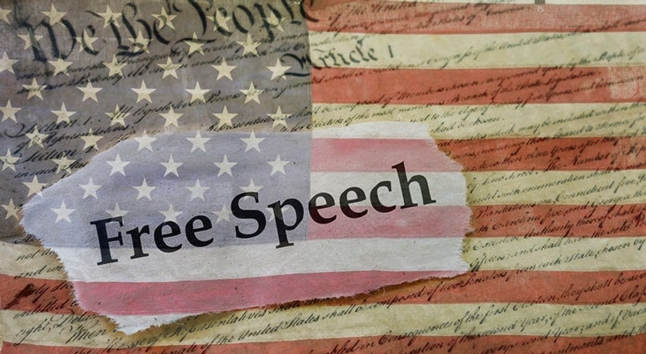John Tyler High School
Tyler,Texas
Class Of 1968

Cornerstones of Democracy #3

Others say it better than I, so here are some links to help you with this topic. As the old saying goes: “Free speech is free except when it ain't.”
Free Speech links & Excerpts – go to the web page to get the full story.
1. https://www.thefire.org/resources/high-school-network/first-amendment-quiz/
1st Amendment online quiz - Answer 13 questions (I got 8 out of 13 - didn't read as closely as I should have!)
2. https://www.history.com/topics/united-states-constitution/freedom-of-speech-video
3-minute video from History Channel: What is free speech? How does the freedom of speech factor in to the U.S. Constitution? What are limitations and protections of free speech in the U.S.?
3. https://www.aclu.org/other/freedom-expression
Opening statement:
Freedom of speech, of the press, of association, of assembly and petition -- this set of guarantees, protected by the First Amendment, comprises what we refer to as freedom of expression. The Supreme Court has written that this freedom is "the matrix, the indispensable condition of nearly every other form of freedom." Without it, other fundamental rights, like the right to vote, would wither and die.

4. https://medium.com/humanist-voices/six-facts-free-speech-fundamentalists-love-to-ignore-8e0daa6fa78b
NOTE: The above has some rough language (F-bomb, etc.) If this bothers you, please skip using the link and just refer to the excerpts below.
Although you may not agree with some of the speaker's opinions or his occasionally coarse words, he does present a very comprehensive list of when Free Speech is not as free as you would think.
There's a joke which sorta fits here: Start talking about bombs at the airport and you'll soon get an Al Qaeda Special Colonoscopy exam for free!
Here are some examples of situations in which pretty much all modern, liberal democracies limit free speech:
-
Most developed countries have some criminal regulation against “Crimes of honor”, such as defamation, calumny, slander and libel
-
Tobacco ads are illegal in most developed countries
-
Alcohol advertisement is highly regulated
-
Pornography depicting minors is considered child pornography
-
Revenge porn has been made illegal in many countries in recent years.
-
Harassment laws criminalize several behaviors around the world.
-
Threats of violence are usually illegal.
-
Personality rights protect people from having identifiable images of them exposed in public against their consent.
-
Public-order laws make it illegal to run around naked shouting obscenities in most countries.
-
Vandalism laws in many cases criminalize graffiti and other forms of unauthorized street art.
5. http://law2.umkc.edu/faculty/projects/ftrials/conlaw/lying.html
Does the First Amendment protect lying? Depending upon the context, the answer is either "no," "yes," or "maybe." It is an interesting question which the Supreme Court is almost certain to revisit. But, take a look at what they've decided so far!!
